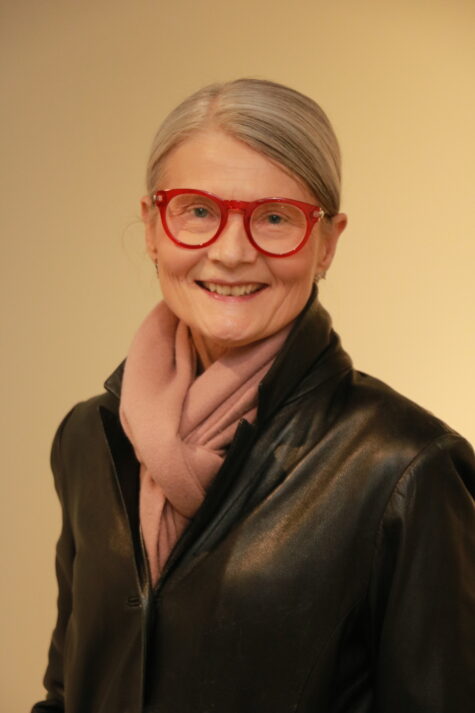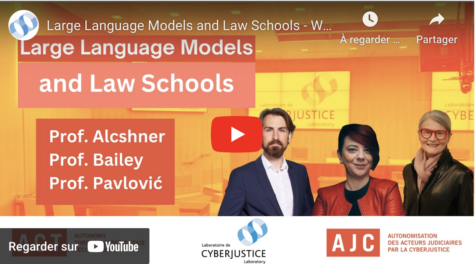Video - Conference "Large Language Models and Law Schools" by Prof. Jane Bailey, Prof. Wolfgang Alschner & Prof. Marina Pavlović
Above, you will find the conference "Large Language Models and Law Schools" by Prof. Jane Bailey (UOttawa), Prof. Wolfgang Alschner (UOttawa), and Prof. Marina Pavlović as part of the 2024 lecture series "AI, Large Language Models, and Justice Considerations for Legal Practitioners Judges, Law Schools, and Public Legal Educators."
Speakers Biographies
 Prof. Marina pavlović
Prof. Marina pavlović
Professor Pavlovic is a member of the Centre for Law, Technology and Society and is the coordinator of the Law & Technology and the Dispute Resolution and Professionalism options. She holds a law degree from the Faculty of Law at the University of Belgrade (Serbia), an LL.M with concentration in Law & Technology from the University of Ottawa, and is called to the Ontario bar.
 Prof. Jane bailey
Prof. Jane bailey
Jane Bailey is a Full Professor of Law at the University of Ottawa where she teaches Cyberfeminism, Technoprudence and Contracts. She co-leads Working Group 3 of the Autonomy Through Cyberjustice Technology (ACT) Project, a 5-year SSHRC-funded partnership initiative led by Karim Benyekhlef of the Université de Montreal that aims to explore whether, and if so, how AI could improve access to justice. She also co-leads The eQuality Project, a 7-year SSHRC-funded partnership initiative focused on young people’s experiences with privacy and equality in digitally networked environments, leading the Project stream on tech-facilitated violence. Her interdisciplinary, international and intersectoral collaborations include co-edited open access publications eGirls, eCitizens, eAccess to Justice, and The Emerald International Handbook on Technology-facilitated Violence and Abuse. She has received numerous honours in recognition of her work, including being appointed to the Canadian Delegation for the UN Commission on the Status of Women (2023), the Ontario Information & Privacy Commissioner Strategic Advisory Council (2022), the International Advisory Group for an Australian Research Council Fellowship Project (2022), and the New College of the Royal Society of Canada (2016-2023), and received the Canadian Bar Association’s Ramon John Hnatyshyn Award for Law (2016). Professor Bailey is a member of the Bar of Ontario and served as a law clerk to the Honourable Mr. Justice John Sopinka at the Supreme Court of Canada. She has also been a Visiting Professor at the University of Hong Kong, Royal Melbourne Institute of Technology, and the Universidad de Puerto Rico.
prof. wolfgang alschner
 Wolfgang Alschner is an empirical legal scholar specialized in international economic law and the computational analysis of law. He holds the Hyman Soloway Chair in Business and Trade Law. His new book, Investment Arbitration and State-Driven Reform: New Treaties, Old Outcomesnorth_eastexternal link, recently published with Oxford University Press (2022), explores how a new generation of international investment treaties has been rolled back in investment arbitration practice. Professor Alschner is an Associate Professor at the Common Law Section with cross-appointment to the Faculty of Engineering, School of Electrical Engineering and Computer Science. He is also a faculty member of the Centre for Law, Technology and Society at the University of Ottawa and heads the uOttawa Legal Technology Lab.
Wolfgang Alschner is an empirical legal scholar specialized in international economic law and the computational analysis of law. He holds the Hyman Soloway Chair in Business and Trade Law. His new book, Investment Arbitration and State-Driven Reform: New Treaties, Old Outcomesnorth_eastexternal link, recently published with Oxford University Press (2022), explores how a new generation of international investment treaties has been rolled back in investment arbitration practice. Professor Alschner is an Associate Professor at the Common Law Section with cross-appointment to the Faculty of Engineering, School of Electrical Engineering and Computer Science. He is also a faculty member of the Centre for Law, Technology and Society at the University of Ottawa and heads the uOttawa Legal Technology Lab.Summary
This workshop is the second in a 5-part ACT Project series entitled “AI, Large Language Models and Justice: Considerations for Legal Practitioners, Judges, Law Schools, and Public Legal Educators”. This fourth session will explore some of the theoretical and practical concerns surrounding use of LLMs in law schools. In it, three professors from the University of Ottawa Faculty of Law (Common Law Section), Marina Pavlovic, Wolfgang Alschner and Jane Bailey will engage in a conversation moderated by Dr Jacquelyn Burkell, Assoc VP Research at Western University. Topics to be discussed will include creative and innovative uses of LLMs in law school teaching, learning and research, as well as related ethical issues and practical approaches for addressing them.
This content has been updated on 5 April 2024 at 11 h 41 min.

